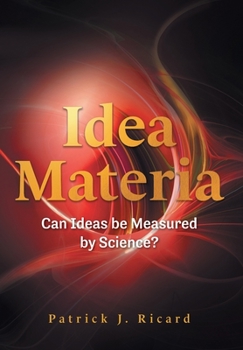Idea Materia: Can Ideas be Measured by Science?
How is it possible that throughout history several inventors around the world have independently invented the same things at the same time? Why does history repeat itself? How do birds know how to migrate, and how can "instinct" be explained? Idea Materia: Can Ideas be Measured by Science? offers an intriguing explanation: a subatomic field of energy that acts as a reservoir of knowledge and ideas that all species can access. Author Patrick J. Ricard proposes that this field - idea materia - crosses the barriers of time and space and allows for individuals to access ideas from the past as well as create new ones that are available for others to access.
While this theory may seem radical at first, Ricard explores how the work of other philosophers and psychologists - from Plato to Jung - and theorists - from Vernadsky to Bohm - have hinted at the existence of something like idea materia. Ricard then expands on these existing theories of ideas to examine all angles of how we experience life, including:
- Can one's identity exist after one's historic lifetime is over?
- How can other species know and experience the objectively real universe?
- Can "truth" be known given how human knowledge is obtained and organized?
Covering the fields of epistemology, metaphysics, linguistics, logic, particle physics, mathematics, psychology, and religion, Idea Materia: Can Ideas be Measured by Science? is both accessible for those new to these areas of study, and thought-provoking for those already possessing such a background. This is a book that encourages ongoing rumination long after you have finished the last page as you will look at yourself and the world in a new way.
While this theory may seem radical at first, Ricard explores how the work of other philosophers and psychologists - from Plato to Jung - and theorists - from Vernadsky to Bohm - have hinted at the existence of something like idea materia. Ricard then expands on these existing theories of ideas to examine all angles of how we experience life, including:
- Can one's identity exist after one's historic lifetime is over?
- How can other species know and experience the objectively real universe?
- Can "truth" be known given how human knowledge is obtained and organized?
Covering the fields of epistemology, metaphysics, linguistics, logic, particle physics, mathematics, psychology, and religion, Idea Materia: Can Ideas be Measured by Science? is both accessible for those new to these areas of study, and thought-provoking for those already possessing such a background. This is a book that encourages ongoing rumination long after you have finished the last page as you will look at yourself and the world in a new way.
Format:Hardcover
Language:English
ISBN:1039149502
ISBN13:9781039149502
Release Date:March 2023
Publisher:FriesenPress
Length:306 Pages
Weight:1.33 lbs.
Dimensions:0.8" x 6.0" x 9.0"
Customer Reviews
0 rating





